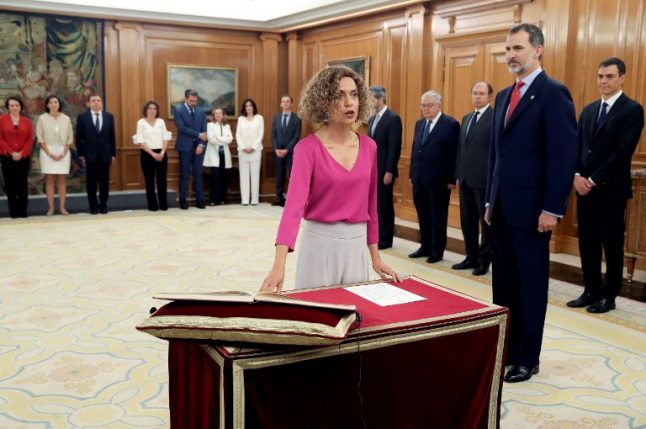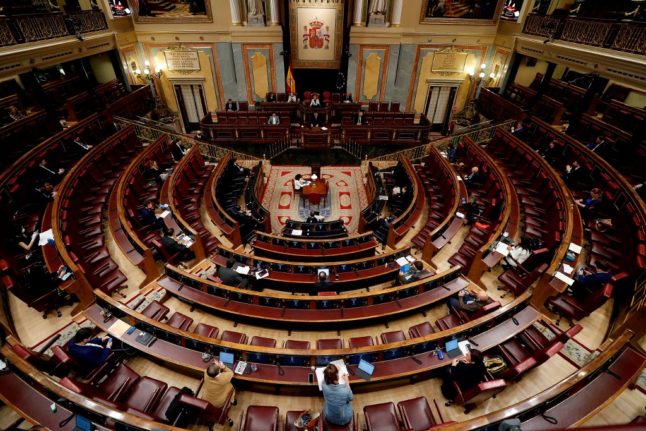The new executive composed by the 46-year-old Pedro Sanchez, who ousted conservative veteran Mariano Rajoy as prime minister last Friday in a no-confidence vote, includes astronaut Pedro Duque as science minister.
EU budget manager Nadia Calvino will become economy minister and former European parliament president Josep Borrell foreign minister.
Sanchez said his executive was “a reflection of the best in society” — a society he described as composed of women and men, old and young, rooted in the European Union.
Promesa ante el Rey de los ministros del nuevo Gobierno https://t.co/hTIgNMECnO pic.twitter.com/9zl6LPc1Qk
— Casa de S.M. el Rey (@CasaReal) June 7, 2018
But it is also a minority government, as the Socialists only have 84 lawmakers in the 350-seat parliament.
As such, the government will have a tough time governing Spain, relying as it will on the votes of far-left party Podemos as well as Basque and Catalan nationalist lawmakers who supported his no-confidence motion.
READ MORE: This is Spain's new cabinet
.jpg)
Former judges, prosecutors
The new executive includes two veteran Socialists — Carmen Calvo, vice-president, and Borrell.
Calvo, who was culture minister from 2004 to 2007, will also be in charge of equality, a priority for Sanchez's government in a country where women staged an unprecedented strike to defend their rights on March 8th.
Anti-terror prosecutor Dolores Delgado will be justice minister, former Supreme Court judge Margarita Robles defence minister, and other women have been put in charge of education, employment or health.
Fernando Grande-Marlaska, a former judge at Spain's top-level National Court, where he took on cases against Basque separatist group ETA, will head up the interior ministry.
Women will also lead the economic team of Sanchez's government, whose “main priority” will be to respect Madrid's deficit reduction commitments to the EU, the new prime minister has said.
Los ministros del nuevo Gobierno prometen sus cargos ante el Rey https://t.co/hTIgNMWdMo pic.twitter.com/OVvuBJbuih
— Casa de S.M. el Rey (@CasaReal) June 7, 2018
Spain has promised to reduce its deficit to 2.2 percent of GDP in 2018, thus finally going under the three percent limit set by Brussels.
The new economy minister will be Nadia Calvino, who is director general for budget at the European Commission and has a 12-year experience in high-level postings in Brussels.
Maria Jesus Montero, meanwhile, will become budget minister after playing a similar role at a regional level in southern Andalusia.
In the name of maintaining “stability,” Sanchez has also promised to implement the 2018 budget crafted by the previous conservative government.
Among the budget's key measures are a one to three percent rise in the lowest pensions and a salary increase for civil servants, ahead of municipal, regional and European elections next year.
Catalans, astronaut, author
Sanchez's new team, which the Socialist leader presented to King Felipe VI earlier Wednesday, also includes a minister in charge of science, innovation and universities.
And the man to take that role is Spain's first astronaut Pedro Duque.
Rocket man: Spain's first astronaut appointed science minister
As Brexit gathers pace, and with Italy now led by a eurosceptic, populist government, Spain's new executive is distinctly pro-EU.
Apart from Calvino's appointment as economy minister — a move welcome by the EU Commission — Borrell was European parliament president between 2004 and 2007.
A Catalan who is fiercely against the independence movement in his home region, he will be tasked with defending his government's commitment to Spanish unity abroad.
Borrell has said the previous conservative government was “very bad” when it came to public relations abroad on the Catalan separatist issue.
On a day-to-day basis, Meritxell Batet, another Catalan, has been put in charge of relations with Spain's regions.
As such, she will have the prickly task of trying to ease the situation in her own deeply divided home region.
Finally, Maxim Huerta, an award-winning author, will become culture minister.




 Please whitelist us to continue reading.
Please whitelist us to continue reading.